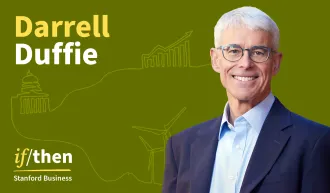Why the “Venture Mindset” Is Not Just for Tech Investors
How venture capitalists approach risk has lessons that apply beyond Silicon Valley, according to a new book.
May 10, 2024

Successful VCs know when to hold ’em and when to fold ’em. | iStock/BrianAJackson
In most of the business world — and the world in general — the default setting is caution, consensus, and, above all, a low tolerance for bad bets. Venture capitalists are not wired this way. In their quest for the next Google, Amazon, or OpenAI, they run headlong into uncertainty and embrace contrarianism. They accept that failure is an option as they invest in deal after deal that never takes off.
They do this because more than 50 years of VC investments have proved that this approach works, explain Ilya Strebulaev and Alex Dang. In their new book, The Venture Mindset: How to Make Smarter Bets and Achieve Extraordinary Growth, they identify nine principles that define this way of seeing the world. And they argue that this mentality has applications far beyond Sand Hill Road. “The farther you are away from the world of VC and Silicon Valley, and the less you think your industry is vulnerable to being affected by what is happening in the VC realm, the more you need this book,” they write.
Strebulaev, a professor of finance at Stanford Graduate School of Business, has been researching and teaching about startups and venture investing for over a decade. Dang, MS ’14, a tech executive and innovation advisor, has worked at Amazon and AWS, and as a McKinsey & Company partner. (He’s also one of Strebulaev’s former students.) They sat down with Stanford Business to discuss the venture mindset and why it’s not just for VCs chasing tech unicorns.
The venture mindset is quite different from the way many people approach risk and make decisions. What makes it unique?
Ilya Strebulaev: The venture mindset works in an environment where there is a lot of uncertainty, where there are a lot of unknowns, where nobody knows the truth, and we expect a lot of changes. The traditional mindset typically works very well in a stable environment. Indeed, in the past, many industries were stable for decades before something disrupted them. Now we see industry after industry undergoing dramatic changes. The VC mindset is becoming more and more useful and likely will dominate — or should dominate — a number of industries for a while.
In the traditional mindset, you better not consider many options, because all the options are relatively similar. You don’t want to incur the cost of exerting a lot of effort to find something that is just marginally better. In the venture mindset, one of the principles is “Say no 100 times,” which means that for each deal venture capitalists invest in, they consider and say no to more than 100 deals.
Alex Dang: In a stable environment, you would rather not fail that often; you would rather not miss. In the venture mindset environment, you would rather not miss your next Google. So that’s why you have to make sure that you swing for the fences and make sure that you have enough home runs.
Strebulaev: As we say, “Home runs matter, strikeouts don’t.” And if you look at the statistics of venture returns, you see this clearly.
How do you distinguish between occasionally hitting a home run and sheer luck?
Strebulaev: We’re asked this question all the time. The answer is very straightforward: If you have luck and luck again and luck again, that’s no longer luck. Having luck repeatedly is a great skill.
Dang: I used to work for Amazon. They launch new businesses and ventures out of nothing at a pretty unimaginable pace. My office had this wall with press releases and announcements of products that my team had launched. Some of them were very successful, but some of them were failures. Why? Because I wanted to demonstrate that failures do matter and that it’s critically important to have them in your portfolio.
Another unique feature of the venture mindset is how it handles disagreements within teams. How do VCs avoid decision-making by consensus or groupthink?
Strebulaev: Naturally, it feels like consensus is a good idea — and sometimes it is, in the traditional world. But in the world where the venture mindset is applicable, consensus is a very dangerous thing. One of the VCs we quote in the book, Alex Rampell from Andreessen Horowitz, says, “Conviction beats consensus.” In the venture mindset, the idea is that you can proceed as long as a deal has a champion who can convince some others, but not everybody.
One example that Alex and I really like is the story of Reid Hoffman. He did the due diligence and decided that investing in Airbnb was a great idea — at the time when Airbnb was still a scrappy startup. In his venture capital firm, he proposed the idea and the partnership was against it. In fact, one of the senior partners told him, “Look, every VC needs to have a deal they can fail on. Airbnb can be yours, right?” In a traditional organization, they never would have invested in Airbnb.
Why don’t more established corporations use the venture mindset?
Strebulaev: Successful large corporations become more risk-averse with time because they have assets and cash flows to protect. If they don’t control the process and culture on purpose, then the traditional mindset is a natural tendency. And once that happens, it’s not that easy to change — but it is possible.
Dang: What Ilya just said is critical: The natural tendency is to become risk-averse — and it is essential not to allow this mindset to spread across the organization. Yet there are plenty of large corporations that have managed to create new ventures within themselves or generate ones that would be considered unicorns — like Nestlé launching Nespresso, Tencent launching WeChat, Google launching Gmail or Google Cloud, or Apple launching the iPhone.
How does the VC mindset balance the potential for regretting a missed opportunity with the danger of betting on something that might tank?
Dang: The venture mindset should not be applied across all decisions, especially in more traditional decision-making situations, like, say, budgeting your day-to-day operations or improving your supply chain. That’s where you need perfection rather than swinging for the fences every single time.
For innovative stuff, that’s where the venture mindset is critical. However, it’s not like gambling. And it’s not about betting the farm to win a lot. We outline a “Double down or quit” principle. You don’t bet all of your fund on one idea right away. You split your fund and start with a small fraction of your fund at the seed stage or series A stage, and you make a small investment to see whether that resonates with the user. Then, if you collect positive signals from your customer, you double down or quit.
You use a lot of sports and gambling metaphors in the book. Of them is “Bet on the jockey.” What does that mean?
Strebulaev: When venture capitalists invest, especially at an early stage, they care more about the “jockey” — the founding team, the management team, the employees — than the “horse” — the business model, product, market, et cetera. Obviously, VCs care a lot about stuff like business models and the size of the total addressable market; you cannot win with a donkey. But the jockey matters way more in the venture capital world than in many traditional organizations.
Dang: The challenge is that when you launch a new venture, you never know what will work and what won’t. You can polish your business plan projections to death, but unfortunately, the reality in six months will be way different. So your bet is on the team that will solve all these challenges and problems on the way.
Can aspiring startup founders use the venture mindset to reverse-engineer how potential funders are approaching them?
Strebulaev: Reverse engineering is very important because whenever you meet with venture capitalists who will be considering you, you need to know exactly how they view you. What most founders don’t realize is that venture capitalists use a different decision-making process at the top of the “deal funnel,” where they have hundreds and hundreds of deals and try to limit them to dozens, versus down the funnel, where they have maybe 10 deals and try to make one investment. We call this “fast lane” and “slow lane.”
In the fast lane, you have to make decisions very quickly. Founders are typically unaware of how venture capitalists make those decisions. They make it by asking a very specific question, “Why should we not proceed with this investment?” The moment I meet you and identify a critical red flag, I will stop even thinking about the investment. I’ll move on. In the slow lane, it becomes a very different kind of due diligence. I tell my students, “You can guess where you are in the funnel by the sort of questions you’re asked, by who’s meeting you, how these meetings go.”
How have you integrated the VC mindset into your work or personal life?
Dang: I now believe more in the experimentation and in making big bets. I click the “send” button way more often than before because I now expect that many of my requests, sometimes wild requests, will be simply rejected or never answered. I keep in mind that if I want to test something new, if I want to have a really large funnel, that’s what I need to do. Thankfully, the response rate when I send an email or request is better than 100 to one.
Strebulaev: We say, “Get outside the four walls,” which means that VCs try to develop diverse networks to increase the sourcing where they find deals. Why? Unlike in the traditional environment, you don’t know where all those outliers are going to come from. I’ve been traveling all the time for more than 20 years. In the past, I’d board the plane and would not talk to anybody. These days, my venture mindset principles tell me I have to get outside the four walls, so I’m trying to meet other people. You can talk to 20 other people and nothing interesting will come out of it. And then you talk to the 21st and something interesting will come out. It could be an investment opportunity, a new research idea, or the idea to write a book!
For media inquiries, visit the Newsroom.
Explore More

How To: Reject Pitches Like a Venture Capitalist

Quick Study: How to Think Like a Venture Capitalist



